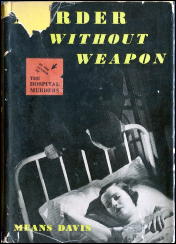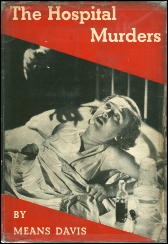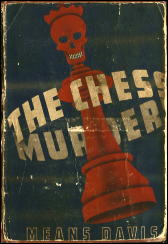Sun 13 Jun 2010
Reviewed by William F. Deeck: MEANS DAVIS – Murder Without Weapon.
Posted by Steve under Authors , Bibliographies, Lists & Checklists , Reviews[8] Comments
William F. Deeck
MEANS DAVIS – Murder Without Weapon. Harrison Smith & Robert Haas, hardcover, 1934.
Memorial Hospital may be a fine place to visit. It is not a good idea to be one of its patients. One doctor thinks hot coffee and bromos induce sobriety. Another doctor also believes black coffee will straighten out a drunk, but he in addition employs a stomach pump that he just happens to have in his pocket while attending a funeral.

(The stomach pump is an odd instrument, consisting of a long tube with an oval bulb at one end. The patient, or victim, swallows the end with the bulb. Shortly thereafter, by gravity or faith or something, the stomach contents gush forth through the tube.)
The hospital’s physician-in-chief describes an aunt’s obsessive interest in her nephew as an Oedipus complex. Another doctor, an expatriate German, says, gutturally of course:
He is preaching to the converted while holding on to the converted’s thighs, but it’s a good example of how a mystery author craftily contrives to subtly. convey information amid a somewhat mixed metaphor. The converted, by the way, is a nurse; when “she whispered, her nose, which was too long, and her lips, which were too full, contorted sensuously.”
The author may mean “sensually”; then again, he may not. He may also know what he’s talking about; I don’t. Noses contorting sensuously or sensually are beyond my comprehension.
This same doctor, something of a ladies’ or at least a nurses’ man, observes the heroine and, wouldn’t you know, mutters:

Not satisfied with these M.D.’s, the author introduces, should any reader have unwisely reached this point, Timberlake Pitts, a lawyer so oleaginous that Uriah Heep would be forced to view him askance.
And there is the heroine’s brother, a seldom-do-well whose “charm lay in the rapidity with which the pockets under his eyes could relax into silver-gray shadows.”
Remember, I just report; don’t expect me to explain.
Max Higgins, whom many of you will recall from The Hospital Murders (1934), a book I really want to read after I recover from this one, is in Memorial Hospital with a kidney problem. The hospital authorities ask him to investigate. Since he cannot leave the hospital, he calls in his assistant.
The reason I bought Murder Without Weapon was the chapter titled “Snod Smooty Starts Snooping.” Snod is something of a Saul Panzer, only more talented:
Actually, it is only when Snod is around that the novel becomes semi-interesting. When asked what he’s been doing recently, he replies that he has been involved in prison work. Asked what he discovered, he says: “Usual thing. Perversion and pellagra. Result: Riots.'”

When I once read a mystery that had a shark as the murder weapon — no, nothing so mundane as the shark eating the victim — I thought I could no longer be surprised by any murderous device. Means Davis did astonish me here with a unique, I would hazard, method of inducing death, or possibly insanity, though it would seem to work only with elderly ladies who have weak hearts and with young ladies who are neurasthenic.
Luckily it’s a weapon bloody difficult to find and employ.
Plot? With all of the above, you want a plot, too? There’s just no satisfying some readers. Well, an elderly lady dies in the hospital after screaming three times and saying, “Vi’s eyes.” And then the heroine sees eyes and screams for 15 minutes and is put away in the same hospital. And then another elderly lady dies in the hospital with a look of awful horror on her face, a look that any sensible reader had long before she got the idea.
Bibliographic Notes: As Bill pointed out in his review, Max Higgins appeared in one other detective novel by Means Davis, that being The Hospital Murders, 1934, also published by Smith & Haas. He did not mention a third mystery by the author, that being The Chess Murders (Random House, 1937).
A fact that Bill did not know, or he would have used a different pronoun in referring to the author, is that Means Davis was the pen name of Augusta Tucker Townsend, 1904-1999.
An online obituary notice for Mrs. Townsend tells us more about her:
[UPDATE] 06-16-10. I’ve found copies of all three books for sale online, and the first has already arrived. I’ve just added the cover image of The Hospital Murders; the others will be included as soon as they get here.
[UPDATE #2] 06-25-10. As you see, I now have cover images for all three books. All three that I ordered arrived in due course, and all three had jackets, even though I did not pay more than $20 for any one of them, including shipping. That the jackets are somewhat the worse for wear is not worth mentioning.
June 13th, 2010 at 4:19 pm
How did this one escape Bill Pronzini’s GUN and SON OF GUN IN CHEEK? You don’t get much more alternative than this sounds.
I guess a Means to an end and a Means to a Davis aren’t that far apart.
“Straw colored” ears?
Maybe that was a ‘scentuous’ nose.
June 13th, 2010 at 4:24 pm
I will ask Bill Pronzini this evening if he has any of the three Means Davis books. Bill Deeck seldom did reviews as long as this one. I think he must have really enjoyed writing it!
June 13th, 2010 at 6:10 pm
Thanks for reprinting this one. I really miss read Bill’s reviews of classic titles (almost) no one else ever read, let alone reviewed.
Wait, I take that back. Ellen probably read all of them.
June 15th, 2010 at 1:36 am
I’ve read MURDER WITHOUT WEAPONS and Bill Deeck’s assessment is spot on: it’s every bit as awful as he indicates in his very funny review.
An alternative classic that I wish I’d known about when I was writing the GIC books; I could have done an entire chapter on it and THE HOSPITAL MURDERS, which I’ve also since read.
Interesting to learn that Means Davis was in fact a woman of surprisingly impressive credentials. I wonder if Augusta Tucker Townsend’s nonfiction was anywhere near as bad as her mysteries.
June 15th, 2010 at 1:40 am
While it’s late at night and I can’t come up with examples, this has happened before — I’m sure it has.
A mystery that’s totally flawed from every way you look at it — and you later find out it was written by someone, to put it kindly, you’d expect a whole lot better from.
Don’t know how it happens, but it does.
June 15th, 2010 at 10:31 pm
Gwen Bristow whose INVISIBLE HOST was reviewed here was certainly an alternative writer of mysteries, but a bestselling historical novelist too. Not everybody who tries their hand at the mystery proves to be a natural even if they are gifted in other areas.
For that matter I didn’t think TOUGH GUYS DON’T DANCE or TOUCH OF DANGER by Norman Mailer and James Jones were either writers best work though I liked the latter probably better than it deserves. At least neither was an alternative classic, and both published under their own name.
Luckily for the genre most writers who went ‘slumming’ proved to be more like C. Day Lewis (Nicholas Blake), C. P. Snow, Bernard DeVoto (John Esteven), Gore Vidal, Lawrence Durrell (WHITE EAGLES OVER SERBIA), and Craig Nova (Nick Carter paperbacks) and did a pretty good job of it.
And we sometimes forget that writing mysteries is more a hobby for some writers like John Bingham (the model for John Le Carre’s Smiley), Sir Basil Thompson (former head of Special Branch), Frank Froest (CID Superintendent in charge of foreign nationals), or John Mortimer (the barrister who won the British obscenity case for LADY CHATTERLY’s LOVER) than their first career.
March 31st, 2017 at 7:30 pm
For those who may be interested, Mike Tooney has just discovered that THE HOSPITAL MURDERS is online at:
https://www.gutenberg.org/ebooks/54445
April 17th, 2017 at 3:27 am
Haha, I found The Hospital Murders on Gutenberg and wanted to see what people thought. It is terrible. Patients have been dying (3 murders) in one bed in a private hospital. So a nurse volunteers to stay in that bed; the doctors offer her sleeping powders to keep her calm. But no surveillance or any plan to prevent anything. Sure enough, the next morning she wakes up dead. But at least that allowed them to rule out one suspect. Meanwhile a woman injured in an auto wreck with politician is kidnapped and being hidden away from public view and contact. The doctor involved graciously offers to let her pay her bill in installments.